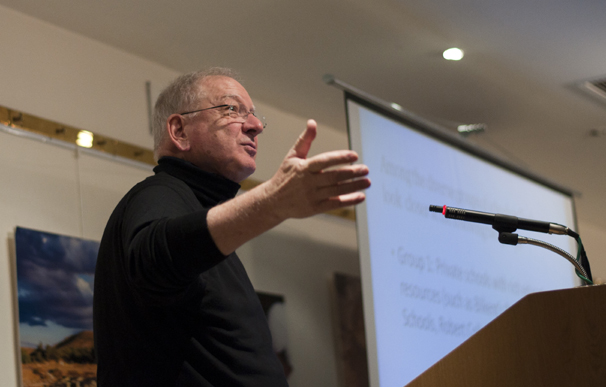Pre-University Education and the Bilkent Experience Explored by Prof. Doğramacı
Prof. Dr. Ali Doğramacı, president of Bilkent University and chair of the Board of Trustees, delivered the first Library Lunchtime Lecture for this semester, entitled "Pre-University Education: the Bilkent Experience," last week on October 5. A capacity audience was on hand to hear the talk, which examined the significance of primary and secondary schools within Bilkent's broader vision.
Emphasizing the fact that education is a continuum, Prof. Doğramacı began his presentation by pointing out the connection between the quality of a student's earlier schooling and that student's eventual ability to succeed at the university level. Turning to the case of the Bilkent primary and secondary schools (BLIS and ÖBL/ÖBİ) in particular, he noted that these schools had direct benefits for the university itself, in terms of both their value in faculty recruitment efforts and also their availability to the university's teacher education programs.
Prof. Doğramacı next looked at the place of the Bilkent schools within the broader context of education in Turkey. While the top private schools, including BLIS and ÖBL/ÖBİ, provide rich educational resources, their cost puts them beyond the means of many families. On the other hand, the selective schools at the apex of the state education system, which have fewer resources but are free of charge, are able to attract large numbers of applicants and admit only the "cream of the crop" from among them. These students typically do very well on the university entrance examinations.
 What if, asked Prof. Doğramacı, more students from this group could be admitted to the elite private schools, with their enormous educational and social advantages? He described the potential result as a "double whammy," benefiting the students themselves as well as the universities where they would eventually study.
What if, asked Prof. Doğramacı, more students from this group could be admitted to the elite private schools, with their enormous educational and social advantages? He described the potential result as a "double whammy," benefiting the students themselves as well as the universities where they would eventually study.
It would also benefit the nation, which spends significantly less on education (3.7 percent of GDP) than the OECD average (6.3 percent). Thus, Bilkent has made a commitment to improving educational opportunities for primary and secondary school students in Turkey, not only on its Ankara campus but also through such programs as its high school in Erzurum; and even beyond the country's borders, by means of the Bilkent School in Erbil, Northern Iraq.
Prof. Doğramacı presented graphs showing the excellence in performance over the last two years by the first students of the İhsan Doğramacı Foundation Bilkent Erzurum Laboratory High School on the Cambridge IGSCE (international curriculum) examination. The first class is due to graduate in 2012, and Prof. Doğramacı noted that Bilkent's commitment to these students does not end there. Graduates of Bilkent-Erzurum who decide to attend Bilkent University will automatically receive full-tuition scholarships.
Following the presentation, Prof. Doğramacı engaged with the audience in a lively question-and-answer session.
.jpg)